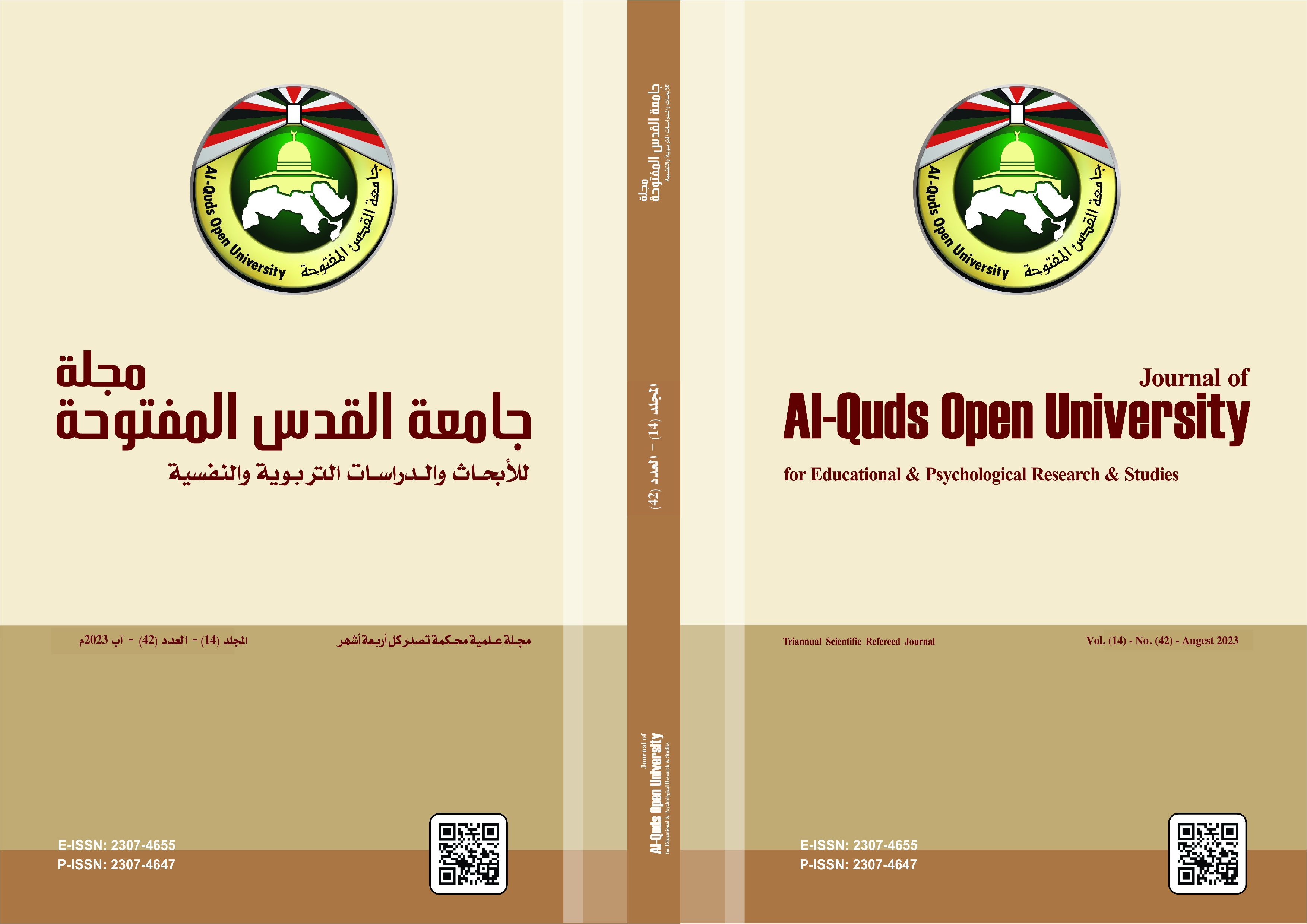The Level of Self-efficacy Among Social Studies Teachers for the Upper Basic Level in Jerash Governorate Schools
DOI:
https://doi.org/10.33977/1182-014-042-003Keywords:
Self-efficacy, social studies teachers, upper basic levelAbstract
The aim of this study is to identify the level of self-efficacy of social studies teachers in Jerash governorate schools. For the purpose of the current study, the researcher followed the descriptive analytical approach. The sample of the study consisted of 269 female /male social studies teachers randomly selected from schools in Jerash city. In order to measure the self-efficacy level, the researcher adopted Smolleck, Zembal-Saul, Yoder, 2006 scale, which is based on social cognitive theory and Pandura’s vision. The scale was included 20 paragraphs. In general, the results showed that there is a medium level of self-efficacy among the social studies teachers. In terms of gender, the study showed that the self-efficacy level was significantly different in terms of gender, in favor of females. For the educational level, a statistical difference in the self-efficacy level appeared in favor of the teachers with bachelor’s degrees. Finally, there was a significant difference in the self-efficacy level attributed to the teaching experience, in favor of the long teaching experience. The study recommends taking into account the variables of gender, educational qualification, and experience when assigning the task of teaching social studies to teachers in the different basic stages.
References
أولاً: المصادر والمراجع العربية:
برقيق، سالمة. (2020). الكفاءة الذاتية لدى معلمي الرياضيات وعلاقتها باتجاهاتهم نحو مهنة التدريس وبعض المتغيرات النفسية لدى تلاميذهم» دراسة تقويمية ميدانَّية ببعض مدراس مدينة نالوت». مجلة كلية الآداب، 29(2)، 22 - 40.
اللحام، رحاب والعدوان، فاطمة. (2022). الكفاءة الذاتية المُدركة وعلاقتها بالرفاه النفسي لدى طلبة الجامعة الأردنية. إدارة البحوث والنشر العلمي (المجلة العلمية)، 38(7)، 70 - 85.
النعيمة، منى والمعمري، سيف. (2022). اتجاهات الطلبة المعلمين تخصص الدراسات الاجتماعية قبل الخدمة نحو قيم الاستدامة خلال جائحة كوفيد19، وتوجهاتهم المستقبلية نحو تدريسها. المجلة العلمية، 38(3)، 172 - 203.
الوائلي، سعاد؛ وعلاء الدين، جهاد. (2013). الكفاءة الذاتية المدركة والممارسات التعليمية الكفؤة كمتنبئات بالرضا الوظيفي للمعلمين. دراسات، العلوم التربوية، 40(2)، 1688 - 1708.
اليوسف، رامي محمود. (2013). المهارات الاجتماعية وعلاقتها بالكفاءة الذاتية المدركة والتحصيل الدراسي العام لدى عينة من طلبة المرحلة المتوسطة في منطقة حائل بالمملكة العربية السعودية في ضوء عدد من المتغيرات. مجلة الجامعة الإسلامية للدراسات التربوية والنفسية، 21(1)، 327 - 365.
ثانياً: المصادر والمراجع العربية مترجمة:
Barqiq, Salima (2020). Mathematics Teachers› Self-Efficacy and its Relationship to Their Attitudes Towards the Teaching Profession and Some Psychological Variables Among Their Students “A field evaluation study in some schools in the city of Nalut”. Journal of the Faculty of Arts, 29 (2), 22-40.
Al-Lahham, Rehab and Al-Adwan, Fatima (2022). Perceived Self-Efficacy and its Relationship to Psychological Well-Being Among the University of Jordan Students. Scientific Research and Publication Department (Scientific Journal), 38(7), 70-85.
Al-Naima, Mona and Al-Maamari, Saif (2022). Attitudes of Pre-Service Student Teachers Specializing in Social Studies Towards the Values of Sustainability During Covid-19 Pandemic, and Their Future Directions Towards Teaching Them. Scientific Journal, 38(3), 172-203.
Al-Waeli, Souad; Aladdin, Jihad (2013). Perceived Self-Efficacy and Competent Instructional Practices as Predictors of Job Satisfaction For Teachers. Studies, Educational Sciences, 40(2), 1688-1708.
Al-Youssef, Ramy Mahmoud (2013). Social Skills and Their Relationship to Perceived Self-Efficacy and General Academic Achievement Among a Sample of Middle School Students in Hail, Saudi Arabia, in the Light of Some Variables. Journal of the Islamic University for Educational and Psychological Studies, 21(1), 327-365.
Youssef, Fadi & Amr, Abdullah. (2012). Science Teachers’ Self-Efficacy & Its Relationship to Their Understanding of the Nature of Science in the Lower Basic Stage From Their Point of View. PhD Thesis, Al-Quds University, Palestine
ثالثاً: المصادر والمراجع الأجنبية:
Calkins, L., Yoder, P., & Wiens, P. (2021). Renewed Purposes For Social Studies Teacher Preparation: An Analysis of Teacher Self-Efficacy and Initial Teacher Education. Journal of Social Studies Education Research, 12(2), 54-77.
Cardullo, V., Wang, C. H., Burton, M., & Dong, J. (2021). K-12 Teachers’ Remote Teaching Self-Efficacy During the Pandemic. Journal of research in innovative teaching & learning, 14(1), 32-45.
Hong, J. C., Liu, X., Cao, W., Tai, K. H., & Zhao, L. (2022). Effects of Self-Efficacy and Online Learning Mind States on Learning Ineffectiveness During the COVID-19 lockdown. Educational Technology & Society, 25(1), 142-154.
Liu, Y., Bellibaş, M. Ş., & Gümüş, S. (2021). The Effect of Instructional Leadership And Distributed Leadership on Teacher Self-Efficacy And Job Satisfaction: Mediating roles of supportive school culture and teacher collaboration. Educational Management Administration & Leadership, 49(3), 430-453.
ŞEKER, M. (2021). An Investigation into Social Studies Teachers’ Self-Efficacy Perceptions About Basic Skills in the Social Studies Curriculum. Review of International Geographical Education Online, 11(2), 317-334.
Sweller, J. (2020). Cognitive Load Theory and Educational Technology. Educational Technology Research and Development, 68(1), 1-16.
Yıldırım, M., & Güler, A. (2022). COVID-19 Severity, Self-Efficacy, Knowledge, Preventive Behaviors, and Mental Health in Turkey. Death studies, 46(4), 979-986.
Bandura, A. (1986). Fearful Expectations and Avoidant Actions as Coeffects of Perceived Self-Inefficacy.
Gibson, S., & Dembo, M. H. (1984). Teacher efficacy: A Construct Validation. Journal of educational psychology, 76(4), 569.
Downloads
Published
How to Cite
Issue
Section
License
Copyright (c) 2023 Journal of Al-Quds Open University for Educational & Psychological Research & Studies

This work is licensed under a Creative Commons Attribution 4.0 International License.
- The editorial board confirms its commitment to the intellectual property rights
- Researchers also have to commit to the intellectual property rights.
- The research copyrights and publication are owned by the Journal once the researcher is notified about the approval of the paper. The scientific materials published or approved for publishing in the Journal should not be republished unless a written acknowledgment is obtained by the Deanship of Scientific Research.
- Research papers should not be published or republished unless a written acknowledgement is obtained from the Deanship of Scientific Research.
- The researcher has the right to accredit the research to himself, and to place his name on all the copies, editions and volumes published.
- The author has the right to request the accreditation of the published papers to himself.







2.png)






_2.png)

